Introduction: In this article, Jane Hampton Cook describes how negotiators for the U.S. and Great Britain tried to forge a peace treaty by Christmas 1814. Jane is a presidential historian and author of ten books, including her new book “Resilience on Parade: Short Stories of Suffragists & Women’s Battle for the Vote.” She is the author of Stories of Faith and Courage from the Revolutionary War. She was the first female White House webmaster (2001-03). Her works can be found at Janecook.com.
From the lyrics of “Hark the Herald Angels Sing” and “I Heard the Bells on Christmas Day,” the sentiment “Peace on Earth” has long been a common refrain during the holiday and Christmas seasons. As old newspapers reveal, Americans and Britons took this sentiment literally when they learned of an opportunity to end the war between them. Peace between the two nations became a Christmas wish in 1814.
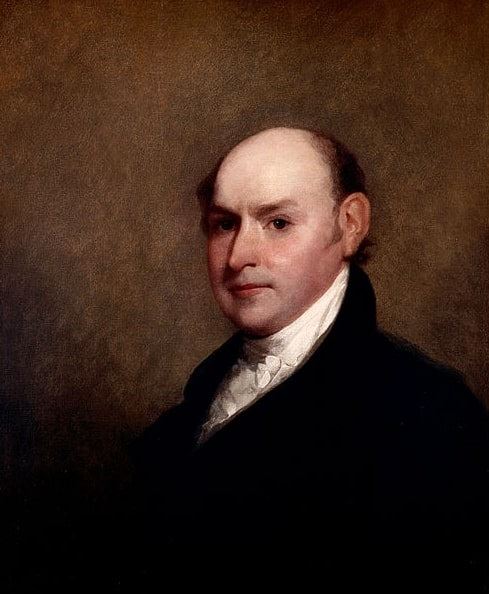
America and England had gone to war in 1812. By the summer of 1814, both governments had sent peace commissioners to Ghent in the United Netherlands (present-day Belgium) to negotiate a treaty. Some hoped to have peace by Christmas while others doubted there was enough time for negotiators, such as John Quincy Adams, to arrive and finish a peace treaty by then.
“The negotiation is yet to begin,” a respected London gentleman wrote a correspondent in Boston. “Perhaps you expect that peace is made or making when the respective commissioners are not even arrived at their destination. If you celebrate peace on Christmas day, you may reckon yourselves very well off.”
The Petersburg Intelligencer of Virginia published this Christmas “wish” on 12 August 1814, months before the holidays.
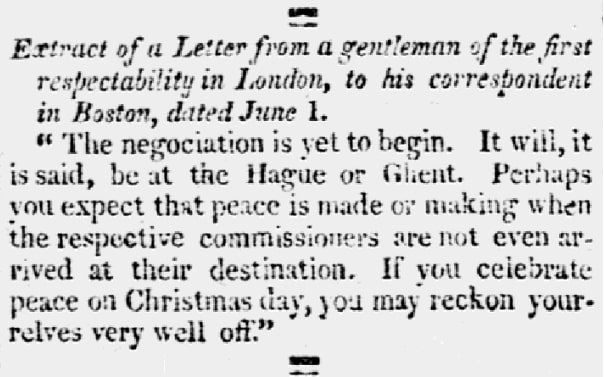
Others were more hopeful.
“The report of Thursday, said to have been brought by the cartel from Halifax, that the negotiation at Ghent had been broken off, was an impudent fabrication,” West Virginia’s Farmer’s Repository reported on 18 August 1814, of news from Britain that had arrived in Canada. “On the contrary, though the people in Halifax generally were growing rich by the war, it was the opinion of the Governor, and the most intelligent people, that Peace would grow out of the negotiation at Ghent, and be concluded before Christmas.”
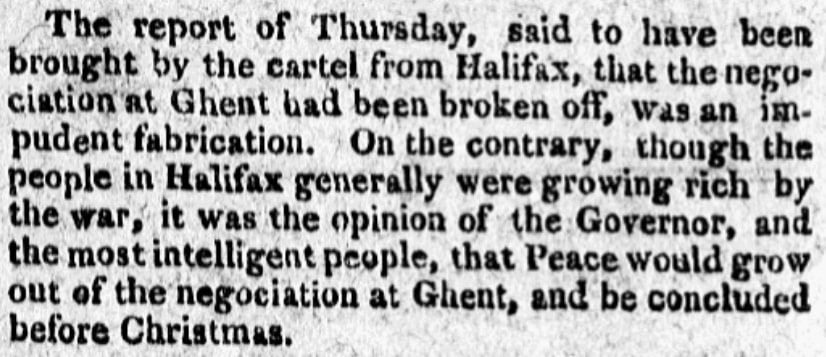
On 19 December 1814, as the holiday neared, the editor of the Aurora summed up the many hopes and doubts for peace.
“We hear daily – and three or four times a day, that peace will flow out of the negotiations at Ghent – some say, that it must be settled before this time – others, a little more liberal, defer it to the good-humored festive time of Christmas – while others, less sanguine, say we shall not have peace before the festival of American independence – if then.”
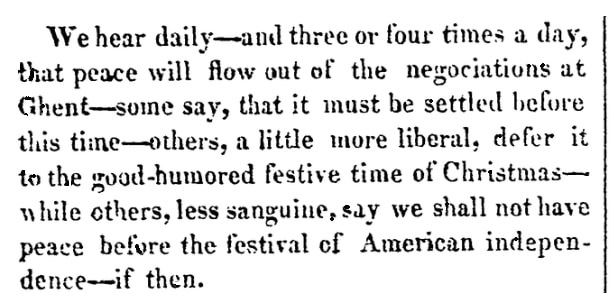
So, did the treaty arrive by Christmas? Yes and no.
“Whereas a Treaty of Peace and Amity between the United States of America and his Britannic Majesty was signed at Ghent, on the twenty-fourth day of December 1814, by plenipotentiaries respectively appointed for that purpose,” began President James Madison’s message to the American people on 17 February 1815.
John Quincy Adams and the other commissioners had secured a treaty by Christmas Day, but Americans did not know about this gift until closer to Valentine’s Day, when the news first arrived in Washington D.C. Newspapers around the nation published Madison’s message and the treaty.
“There shall be a firm and universal Peace between His Britannic Majesty and the United States, and between their respective countries, territories, cities, towns and people, of every degree, without exception of places or persons.
“All hostilities, both by sea and land, shall cease as soon as this treaty shall have been ratified by both parties as hereinafter mentioned.”
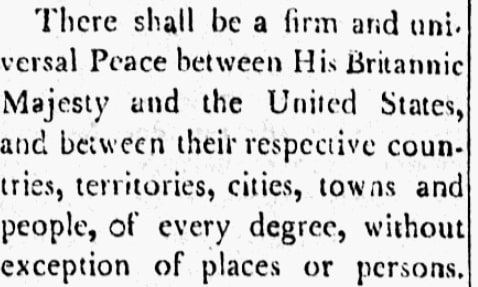
The peace treaty, known as the Treaty of Ghent, returned all land to pre-war boundaries along with all public records and personal papers.
As I wrote in my book American Phoenix about the War of 1812, peace commissioner John Quincy Adams considered the day of the peace treaty’s signing, 24 December 1814, to be the happiest of his life.
“I consider the day on which I signed it as the happiest of my life; because it was the day on which I had my share in restoring peace to the world,” Adams gleefully confessed in a letter to his wife Louisa.
A permanent Peace on Earth came to America and England by Christmas 1814. The two nations have never been to war against each other since.
Note: An online collection of newspapers, such as GenealogyBank’s Historical Newspaper Archives, is not only a great way to learn about the lives of your ancestors – the old newspaper articles also help you understand American history and the times your ancestors lived in, and the news they talked about and read in their local papers.
Explore over 330 years of newspapers and historical records in GenealogyBank. Discover your family story! Start a 7-Day Free Trial
